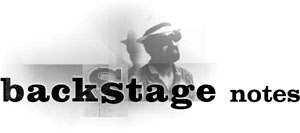 |
 |
|
|||||||||||||||||||||||||||||||||||||||||||||||||||||||||||||
 |
|||||||||||||||||||||||||||||||||||||||||||||||||||||||||||||||
|
At the millennial turnaround: Sinclair here, pinch-hitting for the publisher. As the Blues Century shudders to a conclusion and we prepare to step over the threshold of a new millennium, letís pause and give thanks for a hundred years of unprecedented music. The blues was just starting to emerge as a distinct musical form at the turn of the last century, and itís carried a lot of people an awful long way in the years since. Apart from the Roostermanís look at his favorite recordings from the last 100 years, we havenít spent much time in this issue on end-of-the-millennium matters, but we are looking forward to the first issue of the year 2000 ó which also happens to be the 10th anniversary edition of BLUES ACCESS. Ten years, 40 fine issues ó thatís something to be proud of, and weíll honor Cary Wolfsonís considerable achievement in BA #41. The issue at hand has been produced under extreme duress. I signed on as managing editor August 1st and went straight into production for BA #39. As soon as the magazine left for the printer, I pulled out of New Orleans to start a six-week performance tour of New England and the upper Midwest, minus laptop computer. Moving swiftly from city to city and gig to gig, it was very difficult to keep up with the material coming in through the e-mail, and Iíd like to thank our writers for their extraordinary patience as I tried to learn the job and keep up with their contributions from my disadvantageous position on the road. Adding to the difficulty was the problem of scraping the rust off my editorial skills. I began my long journalistic career in the early í60s as editor of the student newspaper, The Word, at the Flint College of the University of Michigan, where I graduated with a degree in English Literature in January 1964. I moved to Detroit that April to begin graduate studies in American Literature at Wayne State University and for the next several years served as editor of a succession of "underground" magazines and tabloid newspapers. I covered the Detroit jazz scene for downbeat magazine and contributed record reviews to Jazz, Coda, Jazz & Pop, Sound & Fury and other national magazines. In the mid-í70s, after a decade of doubling as a cultural and political activist, tripling as manager of the MC-5, Mitch Ryder and other Detroit bands, and quadrupling as a concert and festival producer ó including three Ann Arbor Blues & Jazz Festivals ó I took an assignment as arts editor, and later editor-in-chief, of a Detroit tabloid called The Sun. When the paper folded in 1976, I went back to cultural activism as executive director of a musiciansí cooperative, the Allied Artists Association, and established the short-lived Detroit Jazz Center as a focal point for jazz performance, education, research and archival activity in the city of Detroit. During the glorious days of the Carter administration, I designed programs and wrote grants for a wide variety of community-based arts organizations and served as an Expansion Arts panelist for the National Endowment for the Arts. When the Reagan administration came into power in 1981, I left the non-profit arts community and worked for several years as an artistsí manager, booking agent and free-lance writer based in Detroit. In 1988 I was offered a position by the Detroit Council of the Arts as editor of City Arts Quarterly and the opportunity to design and teach classes in the History of Rock & Roll and Blues History in the music department at Wayne State University. This was rewarding work, but severe cutbacks in arts funding by the Bush administration and its allies in Michigan government doomed the cityís arts magazine to an early demise, and when my job ended I pulled up 50 years worth of stakes in Michigan and moved to New Orleans to pursue a new career as a poet, performing artist, music journalist, radio broadcaster and record producer. I juggled these several hats throughout the í90s, released four CDs of my work in verse (three with musical accompaniment), went out on the road as a performer, wrote a lot of stories, reviews and liner notes, produced a series of CDs from my vast tape archives, designed and produced WWOZ Radioís live broadcast from the New Orleans Jazz & Heritage Festival, and generally scuffled hard to make a living without a regular job to count on. When Cary Wolfson called me one day in late July and invited me to begin work immediately as Leland Ruckerís replacement as managing editor of BLUES ACCESS, I jumped at the opportunity ó and here I am, up to my neck in editorial work once again. My first two issues have been transitional ones where Iíve basically managed to bring in and prepare for publication feature stories, columns and reviews already in progress. Now Iím looking forward with mounting excitement to putting together my first real issue, beginning both the magazineís second decade and a whole new century, and itís a challenge thatís bound to be rewarding indeed. This is a great place to be at the outset of a new millennium, and Iím happy to be here with you, dear readers, as we follow the blues into its second hundred years. ó JS
|
|
|